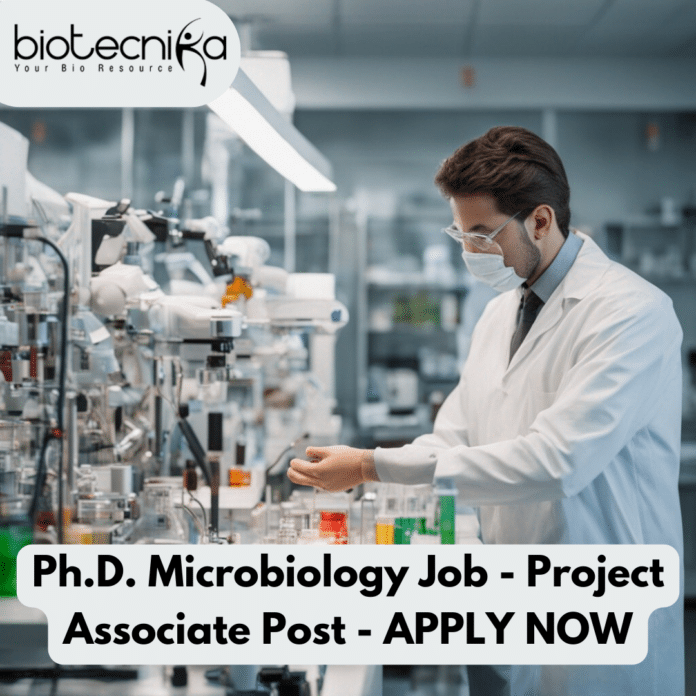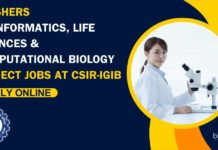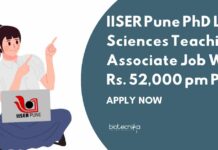Periyar University Project Associate Job For Microbiology Candidates – Apply Now
Periyar University Project Associate Job For Microbiology Candidates – Apply Now. PhD Microbiology Jobs. Interested and eligible applicants can check out all of the details on the same below:
This job expires in
Department of Microbiology
PERIYAR UNIVERSITY
SALEM -636011, TAMIL NADU, INDIA
NAAC A++ Grade -State University – NIRF Rank 59
Advertisement for the post of PROJECT ASSOCIATE
Application are invited for the post of Project Associate (1 post) in the sanctioned Project funded by DBT – PhD Microbiology Job
Title of the Project : Exploring marine actinobacteria for anti-infective and Industrial
products
Duration : 1 year (The position is purely temporary and co-terminus with the
duration of the project).
Job Title & No. of Post : Project Associate (One Post)
Emoluments : Rs. 35,000/- per month + 16% HRA
Qualifications : Ph.D. in Microbiology with one year of research experience in the field
of Actinobacteria and its bioactive compounds as evidenced by publications.
How to apply :
Interested/eligible candidates may download the application form from the university website (www.periyaruniversity.ac.in). The filled-in application form should be submitted along with the following documents through email
([email protected]) before 4th September 2023 for consideration. Only shortlisted candidates will be interviewed online on 7th September 2023 through online.- Latest CV along with attested copies of all relevant testimonials
- Copy of publications
- Certificates and mark sheets to be enclosed
Check the notification below
Here are some potential interview questions and answers for the PhD Microbiology Job – Project Associate position :
1. Can you briefly explain your educational background and research experience in the field of Actinobacteria and its bioactive compounds?
Answer: I hold a Ph.D. in Microbiology and have gained substantial research experience in the study of Actinobacteria and their bioactive compounds. My doctoral research focused on isolating and characterizing novel bioactive compounds from marine actinobacteria. This involved various molecular techniques for strain identification, fermentation, and extraction of bioactive metabolites. I have also contributed to research publications in peer-reviewed journals, highlighting my expertise in this area.
2. Could you describe a specific project or research study related to marine actinobacteria that you have worked on previously?
Answer: Certainly. In one of my research projects, I isolated actinobacteria from marine samples and screened them for their potential to produce antimicrobial compounds. I employed both conventional and molecular methods to identify unique strains and assess their bioactivity. Through this project, I was able to identify a promising strain that exhibited potent antibacterial activity against drug-resistant pathogens. This experience has equipped me with a comprehensive understanding of the challenges and opportunities in exploring marine actinobacteria for anti-infective and industrial applications.
3. How have you managed to stay updated with the latest advancements in the field of Actinobacteria research and related areas?
Answer: To stay current with advancements in Actinobacteria research, I regularly follow reputable scientific journals and attend relevant conferences and seminars. I’m an active member of online microbiology communities, where researchers share recent findings and insights. By engaging in continuous learning and networking, I ensure that I’m aware of the latest trends, methodologies, and breakthroughs in the field.
4. The project involves exploring marine actinobacteria for both anti-infective and industrial products. How do you envision balancing these two aspects of the research?
Answer: Balancing anti-infective and industrial product exploration in marine actinobacteria research requires a strategic approach. I would prioritize identifying bioactive compounds with potential antimicrobial properties, as addressing infectious diseases is a critical need. Simultaneously, I would explore the biotechnological potential of isolated strains for industrial applications, such as enzyme production, biofuel synthesis, or bioremediation. By considering both aspects, we can maximize the impact of our research on healthcare and industry.
5. In your opinion, what challenges might arise during the process of isolating and characterizing bioactive compounds from marine actinobacteria, and how would you address them?
Answer: While working with marine actinobacteria, challenges can include obtaining pure cultures, optimizing fermentation conditions, and ensuring reproducibility of bioactivity. To address these challenges, I would collaborate with colleagues to share expertise, troubleshoot technical issues, and optimize protocols. Additionally, I would implement rigorous quality control measures, use advanced analytical techniques, and keep detailed records to ensure the reliability of results. Flexibility and adaptability will be key in overcoming unforeseen challenges.
ALL THE BEST !
Editor’s Note: Periyar University Project Associate Job For Microbiology Candidates – Apply Now. Please ensure you are subscribed to the Biotecnika Times Newsletter and our YouTube channel to be notified of the latest industry news. Follow us on social media like Twitter, Telegram, Facebook and Instagram.






























